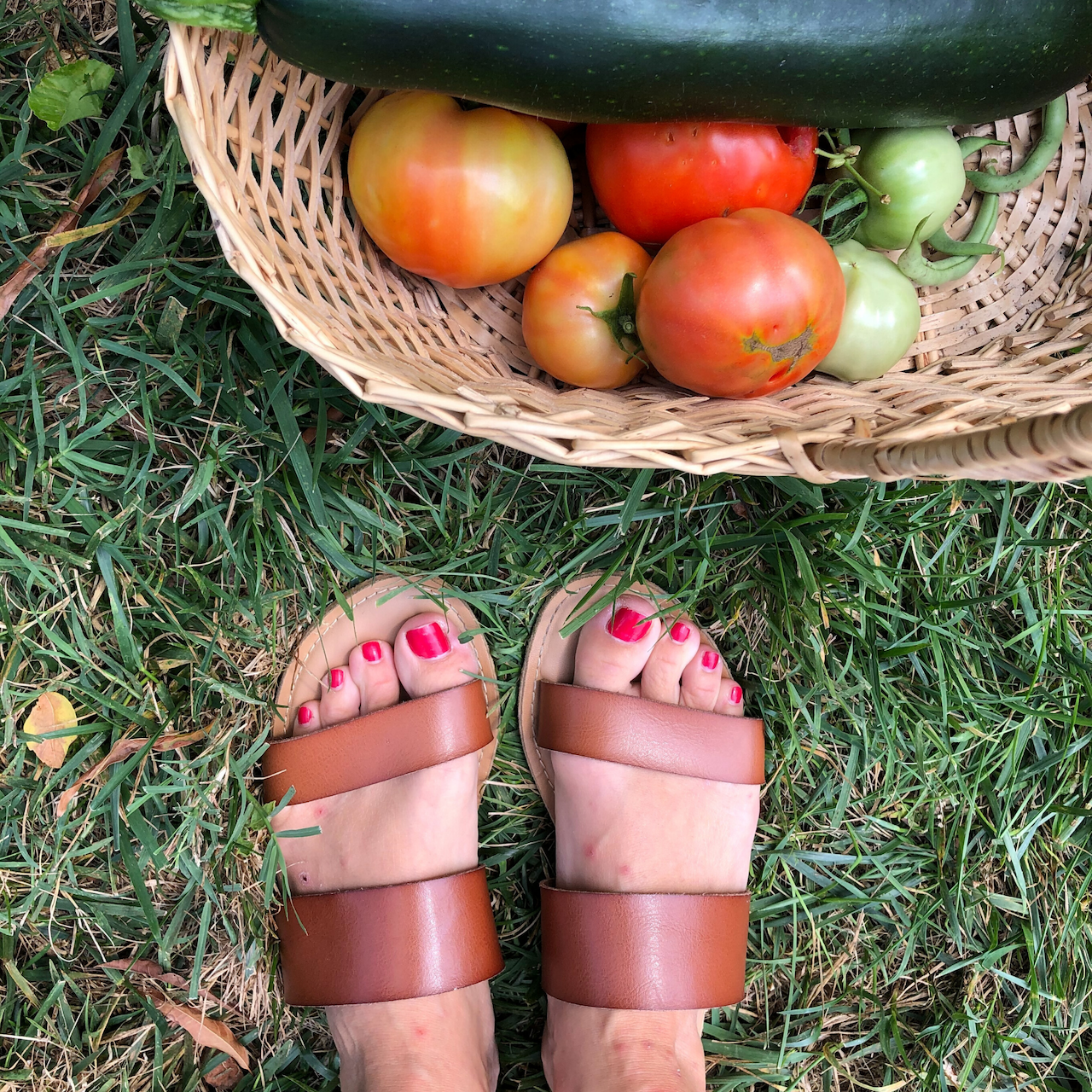
3 Helpful Guides When You Don’t Know What to Pray
She squeezes her eyes shut, folds her hands, and then ever so slowly lifts up her head, reopens her eyes, and locks her gaze on his face. She sits quietly, waiting for him to speak.
“Dear God,” he begins. She echoes. “Thank you for my cheese.” She repeats. “Thank you for goldfish.” Again she mimics his words. He continues to name the foods on the table, the people gathered around it, and in her toddler voice she copies every phrase. He ends with an “Amen,” but she keeps going, “And Jesus, and Bible, and,”— my personal favorite as of the past two weeks—, “Hallelujah!”
My two year old daughter is learning how to pray.
She doesn’t understand who she’s talking to, or why it’s necessary, but she enters into communion with God eagerly and emphatically.
My own prayers often feel scattered, simplistic, and shoddy. Sometimes I don’t know how to pray. It’s not for a lack of words—my thoughts and feelings are rampant. I just can’t seem to put them together in a way that makes sense or fits the sort of conversation I want to have with the Lord.
As I stumble through what feels like a feeble attempt at a robust prayer life these days, just like my daughter, who turns her head and looks to her Daddy, I’ve learned to turn and look to three different guides for help with my prayers.
Where can we look when we aren’t sure what to pray?
We can look to Jesus, to the psalmist, and to the saints who have gone before us.
Each of these guides provide instruction in prayer by modeling for us words and phrases to use in our own prayers. If you, like me, sometimes struggle to know how to pray, perhaps you could pray in one of these ways.
Pray Like Jesus
Jesus, speaking to the crowds in Matthew 6, said, “Pray then like this…” So, I’ve been using the Lord’s Prayer as a guide to structure my own prayers. I take each phrase in turn and apply it to the prayer list in front of me.
“Our Father in heaven, hallowed be your name.” God, you are loving, kind, good, merciful, faithful. These words flow from my lips because I’m confident God is who he says. His character doesn’t change when my circumstances do, so it feels right—even comforting—to adore God in these ways. Before long, I’m remembering the ways God has displayed his character in my own life, and I’m no longer just recounting what I know to be true. My prayers of praise become actual thanksgiving for God’s faithfulness to me. It’s a movement of sorts from praising God because of who he is, to praising God for his specific acts of kindness to his people, to praising him for how he specifically works in my own soul (see Psalm 66).
As I use each phrase—Give us this day our daily bread, Lead us not into temptation, etc.—I pray through the list of family members, friends, and neighbors in my journal. I ask God to meet their physical needs. I pray for believers to resist the devil’s temptations. I pray for opportunities to speak the gospel to my unbelieving friends and neighbors. I confess my sins, pray for my own heart to remain steadfast, and commit it all to the Lord’s will.
Sometimes this process takes a few minutes, other days it takes fifteen or twenty. But in each case, I’m conforming my prayers to the way Jesus taught us to pray.
But Jesus didn’t just teach us how to pray, he also modeled it for us. In John 17, we have Jesus’ words spoken in prayer to God the Father. As we read through the manner in which Jesus spoke to his Father, the phrases he used, and the outcomes he prayed for, we can learn how to structure our own conversations with God.
Pray Like the Psalmist
I read something the other day which stated that Psalms is the only book in the Bible written entirely to God. I had never thought of it that way before, but it’s true. So, why wouldn’t we use the psalms to shape our prayers? Each psalm records a prayer from a real person who took his thoughts and feelings regarding his circumstances to God and then wrote those actual words down in order to guide God’s people in songs and prayer. What a gift we have in Psalms! In his providence, God inspired these prayers and recorded them for us to use as we face every issue of life and every emotion common to man.
When I’m anxious, I turn to Psalm 23. In moments of despair or confusion, I use David’s words in Psalm 42. If I’m struggling to bless God for who he is and what he’s done, I read Psalm 103 and remember all his benefits to his people. When darkness lingers and I can’t see a way forward, I turn to Psalm 88 and realize this is okay. But then I remind myself that God is worthy of praise, even in the dark, for as long as I’m in the dark. When I’m not sure it’s worth the time and effort to read my Bible, I turn to Psalm 1.
I could go on. The point is: every psalm provides instruction for us on how to communicate with God. If you’re not sure where to begin, if you’re curious as to what you’re allowed to say, or if you just need someone to show you how to direct your muddled up soul to the Lord, pray like the psalmist.
Pray Like the Saints
When I graduated from college and moved overseas, I was constantly providing prayer requests for supporting churches, friends, and family. I asked for prayer regarding financial support, safety while living in a Muslim country as a single woman, and good relationships with my teammates. But the thing I wanted more than anything else was to continue growing in my walk with the Lord. So I asked them to pray Colossians 1:9-11, and this became the prayer I would pray for others. Throughout his letters, Paul wrote out what he prayed for the believers in each of the churches he served. He was concerned about their love for Christ, their effectiveness for the gospel, and their growth in Christlikeness. If God’s will is our sanctification, then it’s only fitting for us to pray for him to sanctify us. Paul’s prayers provide words we can pray to this end.
I’ve started choosing one of Paul’s prayers each month to use to specifically guide prayers for my Christian friends. This month, it’s Philippians 1:9-11. Sometimes, when I’m running, I’ll recite these verses and simply name as many people as I can think of. I consider it a great privilege to pray for friends in this way.
We aren’t limited to the prayers of the apostles, though. My favorite prayer resource is The Valley of Vision, a collection of Puritan prayers. I’m particularly drawn to the ways they confessed their sin, directed their thoughts toward the sufficiency of Christ, and sought to live in holiness and devotion to God. You can search for a prayer by topic, or by day of the week, and I find both to be helpful in shaping my conversations with the Lord.
Perhaps the most common, yet overlooked group of saints, are those we know and rub shoulders with on a regular basis. I’ve learned valuable lessons on how to pray from my parents, in-laws, friends, classmates in college, mentors, and youth leaders. I’ve learned how to pray by listening to my husband, my pastor, members of my community group, and women I serve with at church.
I’m even learning how to pray as I hear the eager voices of my children, begging to be the one to pray over our meals or before bed at the end the day. Their words are simple, scattered, and perhaps a little bit shoddy, but they hold nothing back. They raise their voices and eagerly enter into conversations with God.
My children might be learning how to pray, but they’re also teaching me how to pray.
Prayer doesn’t need to be fancy or complicated. We simply get to bring our requests before God, confident that the Spirit prays for us when we don’t know how to pray, and Jesus is interceding for us before the throne of grace. What a privilege we have to engage in conversation with our Heavenly Father. May we come to him eagerly, often, and in great anticipation of what he will accomplish in and through our prayers.
Image by Kelly Sikkema on Unsplash

